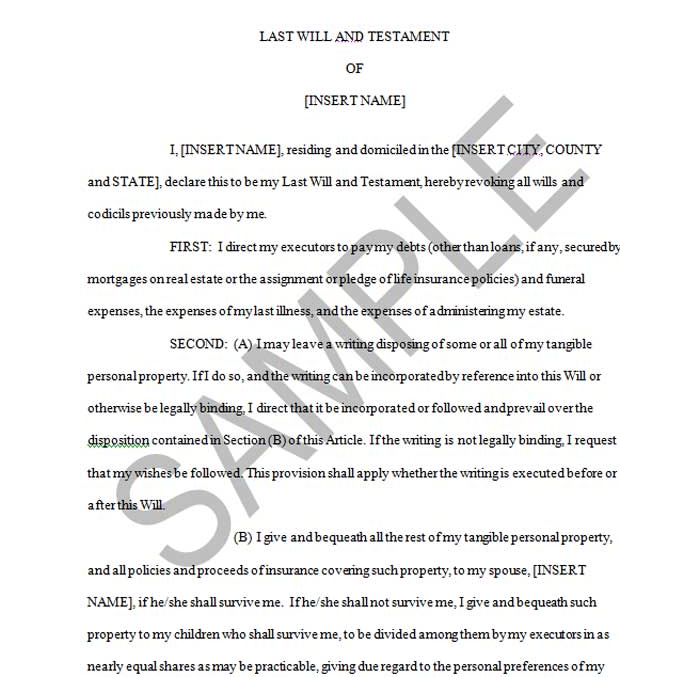Full Unified Credit Trust at first death; marital share outright, children outright at 2nd death; trust fbo grandchildren under age 25 (18 Pages)
In stock
SKU
FullUnifiedCreditTRust
$39.00
This Will provides for the mandatory creation and funding of a unified credit (aka exemption equivalent trust) (Article Third) for the benefit of the testator’s surviving spouse. The balance of the testator’s property passes outright to the surviving spouse. Article Third provides that the surviving spouse is to receive all of the trust income annually, and gives the trustee discretion to pay the trust principal to the spouse for health, support and maintenance. The surviving spouse is also given the discretion to withdraw from the trust the greater of 5% of the trust principal or $5,000 on an annual, non-cumulative basis. (A so-called “Five and Five Power”).
This Will provides for the mandatory creation and funding of a unified credit (aka exemption equivalent trust) (Article Third) for the benefit of the testator’s surviving spouse. The balance of the testator’s property passes outright to the surviving spouse. Article Third provides that the surviving spouse is to receive all of the trust income annually, and gives the trustee discretion to pay the trust principal to the spouse for health, support and maintenance. The surviving spouse is also given the discretion to withdraw from the trust the greater of 5% of the trust principal or $5,000 on an annual, non-cumulative basis. (A so-called “Five and Five Power”).
Article Fourth leaves the balance of the testator’s estate outright to the surviving spouse. If there is no surviving spouse, the balance of the testator’s estate passes outright to children. Similarly, if the spouse survives and the Article Third Trust is created, when the second death of the spouses occurs, the remaining balance of the Article Third trust property passes outright to children (these provisions assume that the children are responsible adults).
Article Fourth also provides that if property passes to a descendant of a child at the later death of the testator and the surviving spouse, such descendant must have attained age 25 to receive an inheritance outright; otherwise a trust is established for such descendant until age 25 is attained.
Note the tax allocation clause contained in Article Sixth directing that any taxes or administrative expenses be paid first from the Article Third Trust. This is done to avoid reducing the marital deduction share (Article Fourth) by taxes and expenses, which would correspondingly reduce the marital deduction. Note also in Article Sixth the discretion given the fiduciaries to address a possible generation-skipping problem by allowing the fiduciaries to take all necessary steps to avoid generation-skipping tax liability should this issue arise.
Note the tax allocation clause contained in Article Sixth directing that any taxes or administrative expenses be paid first from the Article Third Trust. This is done to avoid reducing the marital deduction share (Article Fourth) by taxes and expenses, which would correspondingly reduce the marital deduction. Note also in Article Sixth the discretion given the fiduciaries to address a possible generation-skipping problem by allowing the fiduciaries to take all necessary steps to avoid generation-skipping tax liability should this issue arise.
The order of deaths in Article Ninth (smaller estate holder deemed to be the survivor) is included to attempt to achieve the optimal use of the exemption equivalent in both spouse’s estates in the event of a simultaneous death.
Author:
Steven G. Siegel is president of The Siegel Group, a Morristown, New Jersey - based national consulting firm specializing in tax consulting, estate planning and advising family business owners and entrepreneurs. Mr. Siegel holds a BS from Georgetown University, a JD from Harvard Law School and an LLM in Taxation from New York University.
Author:
Steven G. Siegel is president of The Siegel Group, a Morristown, New Jersey - based national consulting firm specializing in tax consulting, estate planning and advising family business owners and entrepreneurs. Mr. Siegel holds a BS from Georgetown University, a JD from Harvard Law School and an LLM in Taxation from New York University.
He is the author of several books, including: Planning for An Aging Population; Business Entities: Start to Finish; Taxation of Divorce and Separation; Income Taxation of Estates and Trusts, Preparing the Audit-Proof Federal Estate Tax Return, Putting It Together: Planning Estates for $5 million and Less, Family Business Succession Planning, Business Acquisitions: Representing Buyers and Sellers in the Sale of a Business; Dynasty Trusts; Planning with Intentionally-Defective Grantor Trusts; The Federal Gift Tax: A Comprehensive Analysis; Charitable Remainder Trusts, Grantor Trust Planning: QPRTs, GRATs and SCINs, The Estate Planning Course, The Retirement Planning Course, Retirement Distributions: Estate and Tax Planning Strategies; The Estate Administration Course, Tax Strategies for Closely-Held Businesses, and Tort Litigation Settlements: Tax and Financial Issues.
Mr. Siegel has lectured extensively throughout the United States on tax, business and estate planning topics on behalf of numerous organizations, including National Law Foundation, AICPA, CCH, National Tax Institute, National Society of Accountants, and many others. He has served as an adjunct professor of law at Seton Hall and Rutgers University law schools.
The Siegel Group provides consulting services to accountants, attorneys, financial planners and life insurance professionals to assist them with the tax, estate and business planning and compliance issues confronting their clients. Based in Morristown, New Jersey, the Group has provided services throughout the United States. The Siegel Group does not sell any products. It is an entirely fee-based organization.
The Siegel Group provides consulting services to accountants, attorneys, financial planners and life insurance professionals to assist them with the tax, estate and business planning and compliance issues confronting their clients. Based in Morristown, New Jersey, the Group has provided services throughout the United States. The Siegel Group does not sell any products. It is an entirely fee-based organization.

